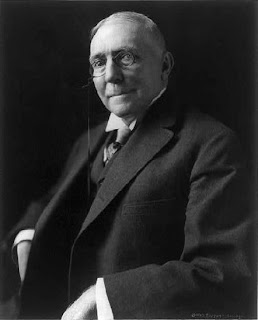He taught us how to understand the music of the birds,
The robin made a tune for us, but Riley wrote the words;
And at his joyous task he wrought with such a wondrous art
That we could feel the happiness that filled the robin's heart.
And when the Spring comes back to us, and once again we hear
The golden song at eventide that rings so true and clear,
And when the April shadows fall across the meadow lane,
The gentle minstrel of the Spring shall sing for him in vain.
He wandered through the village streets the afternoon along,
He heard the children's laughter - and made it into song.
He made it into living song, that down the years shall wing,
And yet in song of simple words that they themselves could sing.
And through all ages and all lands forever - near and far -
In every time and every clime where little children are -
Shall they still thrill at the story time beneath the magic spell
Of him who told them what they thought - and understood so well.
~ To James Whitcomb Riley by James J. Montague
Known as the “Hoosier poet of the people”, and also as the “Children’s Poet,” James Whitcomb Riley, was born in 1849 in Greenfield, Indiana on the “National Road” or U.S. Route 40.
Riley's poetry and prose reflect romance, childhood memories, small town life, family life, friendship, nature, patriotism, and humor. Riley’s chief legacy was his influence in fostering the creation of a midwestern cultural identity. Along with other writers of his era, he helped create a caricature of midwesterners and formed a literary community that rivaled the established eastern literati in popular works. Books of his poetry and prose were published in both the U.S. and in Great Britain.
Riley’s most famous works were written in the Hoosier dialect of the simple farm folk of Greenfield and vicinity. As the famous author and literary critic (and Riley friend), Hamlin Garland, aptly stated: “…from this town, and other similar towns, has Whitcomb Riley drawn the sweetest honey of poesy—homey with a native delicious tang, as of buck wheat and basswood bloom with hints of the mullein and the thistle of dry pastures.” Riley’s work is considered whimsical and direct, as if he were telling stories to children around the fireside.
Three of the most well-known of his hundreds of poems are “When the Frost is on the Punkin,” “The Old Swimmin’ Hole,” and “Little Orphant Annie,” first published in 1885 as “The Elf Child.” This poem inspired not only the Little Orphan Annie legacy but also the famous Raggedy Ann dolls. Interestingly, “The Elf Child” was supposed to be re-entitled as “Little Orphant Allie,” named for a little girl named Mary Alice “Allie” Smith, who was a “hired girl” in the Riley household when the poet was growing up in Greenfield. An error by a typesetter changed Allie to “Annie.”
"Little Orphant Annie's come to our house to stay
An' wash the cups an' saucers up, an brush the crumbs away,
An' shoe the chickens off the porch, an' dust the hearth an sweep,
An' make the fire, an' bake the bread, an' earn her board-an' keep..."
By the end of the eighteenth century and until his death in 1916, Riley was a well-known poet and speaker who toured throughout the U.S. and Europe. He was the first poet in America to receive the gold medal of poetry from the National Institute of Arts and Letters, and he was an honored and regular guest at the White House. Every October the people of his hometown of Greenfield celebrate Riley with the Riley Festival, complete with a parade of all the local school children carrying and depositing fall bouquets at the foot of his statue on the courthouse lawn.
When the Frost Is on the Punkin
When the frost is on the punkin and the fodder’s in the shock,
And you hear the kyouck and gobble of the struttin’ turkey-cock,
And the clackin’ of the guineys, and the cluckin’ of the hens,
And the rooster’s hallylooyer as he tiptoes on the fence;
O it’s then’s the times a feller is a-feelin’ at his best,
With the risin’ sun to greet him from a night of peaceful rest,
As he leaves the house, bare-headed, and goes out to feed the stock,
When the frost is on the punkin and the fodder’s in the shock.
They’s something kindo’ hearty-like about the atmosphere,
When the heat of summer’s over and the coolin’ fall is here—
Of course we miss the flowers, and the blossoms on the trees,
And the mumble of the hummin’-birds and buzzin’ of the bees;
But the air’s so appetisin’; and the landscape through the haze
Of a crisp and sunny morning of the airly autumn days
Is a pictur that no painter has the colorin’ to mock—
When the frost is on the punkin and the fodder’s in the shock.
The husky, rusty rustle of the tossels of the corn,
And the raspin’ of the tangled leaves, as golden as the morn;
The stubble in the furries—kindo’ lonesome-like, but still
A-preachin’ sermons to us of the barns they growed to fill;
The strawstack in the medder, and the reaper in the shed;
The hosses in theyr stalls below—the clover overhead!—
O, it sets my heart a-clickin’ like the tickin’ of a clock,
When the frost is on the punkin and the fodder’s in the shock!
Cassandra's James Whitcomb Riley Collection:
Some decorative publisher's editions of James Whitcomb Riley's books:


















.jpg)



























































.jpg)















I'm surprised you're just now doing a blog on him! But it's a great one!
ReplyDeleteDear Cassandra, Such an interesting posting which I thoroughly enjoyed reading. And, your collection of Riley's books and other ephemera is most intriguing. I think that one of life's great pleasures is to make collections of beautiful things and books for me are always a fascination.
ReplyDeleteDear Cassandra
ReplyDeleteI found your blog today.
And I read and read and read.
It's all so wonderful.
Thanks for sharing !
Have a nice sunday.
Mapi
Indiana is the best state by far and this proves it!
ReplyDelete